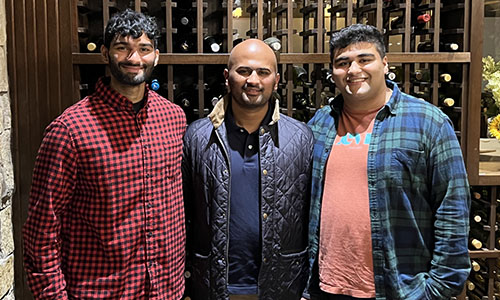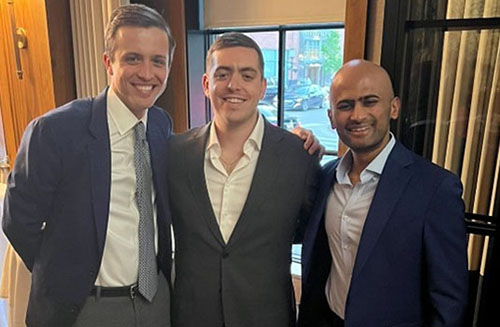Patient StoryNov | 18 | 2024
Innovative Test and Treatment Result in World-class Care for Brain Tumor


During a jog one morning, Rohan Venkatesh noticed his left leg was dragging a bit. A little while later, his left arm started to go limp. Thinking it was nothing more than a pinched nerve, he scheduled an appointment with his primary care physician (PCP) for that afternoon.

It turned out Rohan had suffered what was likely a stroke. The next 72 hours were a whirlwind, culminating in the discovery of a cancerous brain tumor. A new rapid test developed at Mass General Brigham enabled doctors to make that diagnosis and give him life-saving treatment in a timely manner. He has since made an inspiring recovery.
"We don't know for sure if he's doing as well as he is because we gave him this particular drug," said Massachusetts General Hospital neuro-oncologist Deborah Forst, MD. "But we do know that we were able to start him on the drug as early as we did because we had access to this diagnostic technology."
Location of tumor makes traditional biopsy unsafe
At the time of his suspected stroke, Rohan, a resident of Westford, Massachusetts, was a healthy and active 28-year-old. There were no signs that his life was in danger.
By the time he saw his PCP, his symptoms had worsened. He was fully paralyzed on his left side and needed help from his two younger brothers to get out of bed. His mother drove him to the appointment.
The doctor immediately worried that Rohan was having a stroke. She had him transferred via ambulance to a local community hospital. There, an MRI scan early the next morning found a large tumor on his brain stem. Since the hospital lacked the capabilities to diagnose or treat the tumor, he was referred to Mass General.
Over the next couple days, Rohan underwent more scans. A traditional biopsy (in which tissue collected from the body is studied under microscope to check for cancer cells) is usually needed to diagnose a brain tumor and guide the treatment plan. But as Dr. Forst explained, this wouldn't be safe in his case.
"The tumor was in his brain stem, which is a critical area of the brain," she said. "It carries all sorts of nerve pathways that control sleep, breathing, movement, sensation, and more. And it's a really tight area. The neurosurgeons we consulted at Mass General did not think we could get a biopsy without putting him at risk of permanent neurologic injury."
Knowing the exact nature of the tumor was necessary for Dr. Forst to give Rohan the safest and most effective treatment. Fortunately, she knew someone at Mass General who could offer an alternative to traditional biopsy: spine neurosurgeon Ganesh Shankar, MD, MPH.
Exploring a new way to diagnose brain tumors
Dr. Shankar had been working for about a decade with his colleagues in neurosurgery, oncology, and pathology on a new way to diagnose brain tumors. The approach is called Targeted Rapid Sequencing (TetRS).
With TetRS, a small amount of fluid is taken from the patient via lumbar puncture (spinal tap). A pathologist then analyzes the sample for genetic mutations that are unique to certain brain cancers.
"One of our goals is to keep patients like Rohan, for whom a surgical biopsy would be a high-risk procedure, out of the operating room," Dr. Shankar said. "Secondly, we want to turn around results quickly so that the patient can get started on treatment as soon as possible."
In fact, TetRS has decreased time to diagnosis from 10 days to two. Better yet, since it costs little money to run the test, TetRS could become a viable option for many other hospitals in the coming years.
TetRS showed an IDH1 mutation in Rohan's tumor. This suggested it was a high-grade glioma, a tumor that starts in the brain and tends to grow and spread quickly.
Having this information allowed Dr. Forst—with input from members of a multidisciplinary tumor board—to design an individualized, research-driven treatment plan for Rohan. It started with proton beam radiation under the watch of Mass General radiation oncologist Kevin Oh, MD. Rohan also received chemotherapy and began physical therapy and occupational therapy at Mass General.
Rohan was discharged a couple days after starting proton therapy. Six weeks later, tests showed the tumor had shrunk. Now he would start a new phase of treatment. Chemotherapy, which had been causing dangerous side effects, was stopped. And he transitioned from proton therapy to a then experimental drug known as an IDH inhibitor. The medication is designed especially to treat IDH mutant gliomas like Rohan's.
"IDH inhibitors target the tumor cells rather than the normal, healthy cells throughout the body," Dr. Forst said. "This may be why we see fewer side effects with these drugs than with conventional chemotherapy."
Since Rohan was treated, the use of IDH inhibitors has become more widespread. In August 2024, the U.S. Food and Drug Administration approved the first IDH inhibitor for use in patients with certain IDH mutant gliomas.
Glioma remains controlled while recovery continues
Rohan's tumor will never completely go away, so he will require an IDH inhibitor or other treatment for the rest of his life. While initially in a wheelchair, he has regained the ability to walk. Since earning his adaptive driver's license, he can also drive a car again.

Now 32, Rohan lifts weights and does cardiovascular exercises for 45 minutes a day. In addition, through rigorous neuro-physical therapy along with strength and conditioning training, he continues to improve function on his left side. In September 2024, he completed the Mass General Cancer Center Eversource 5k Walk.
Every three months, Rohan sees Dr. Forst to review his latest MRI. "Everything has looked perfect so far," she said. "I'm hopeful we will one day feel comfortable extending the time between these scans. But for now, we're keeping a close watch."
About a year after starting treatment, Rohan met Dr. Shankar for the first time via a Zoom call. They met in person the next year, which gave Rohan a chance to learn more about Dr. Shankar's work—and Dr. Shankar a chance to meet one of the beneficiaries of his efforts.
"From a patient care standpoint, I'm so grateful I'm at Mass General," Rohan says. "Dr. Forst and Dr. Shankar are both incredibly kind, respectful, and empathetic. I know they have my best interests at heart, and they make me very confident in the quality of care I'm receiving."
Originally published on Mass General Brigham on November 4, 2024.
-
![]()
- Department of Neurology
-
![]()
- Clinical Director, Radiation Oncology
-
![]()
- Associate Professor of Neurosurgery, Harvard Medical School
Related Program
Type
Centers and Departments
Topics
Patient Stories
View inspiring cancer survivor stories from Mass General Cancer Center’s community of patients, families, and staff.
Mass General Cancer Center
An integral part of one of the world’s most distinguished academic medical centers, Mass General Cancer Center is among the leading cancer care providers in the United States.



